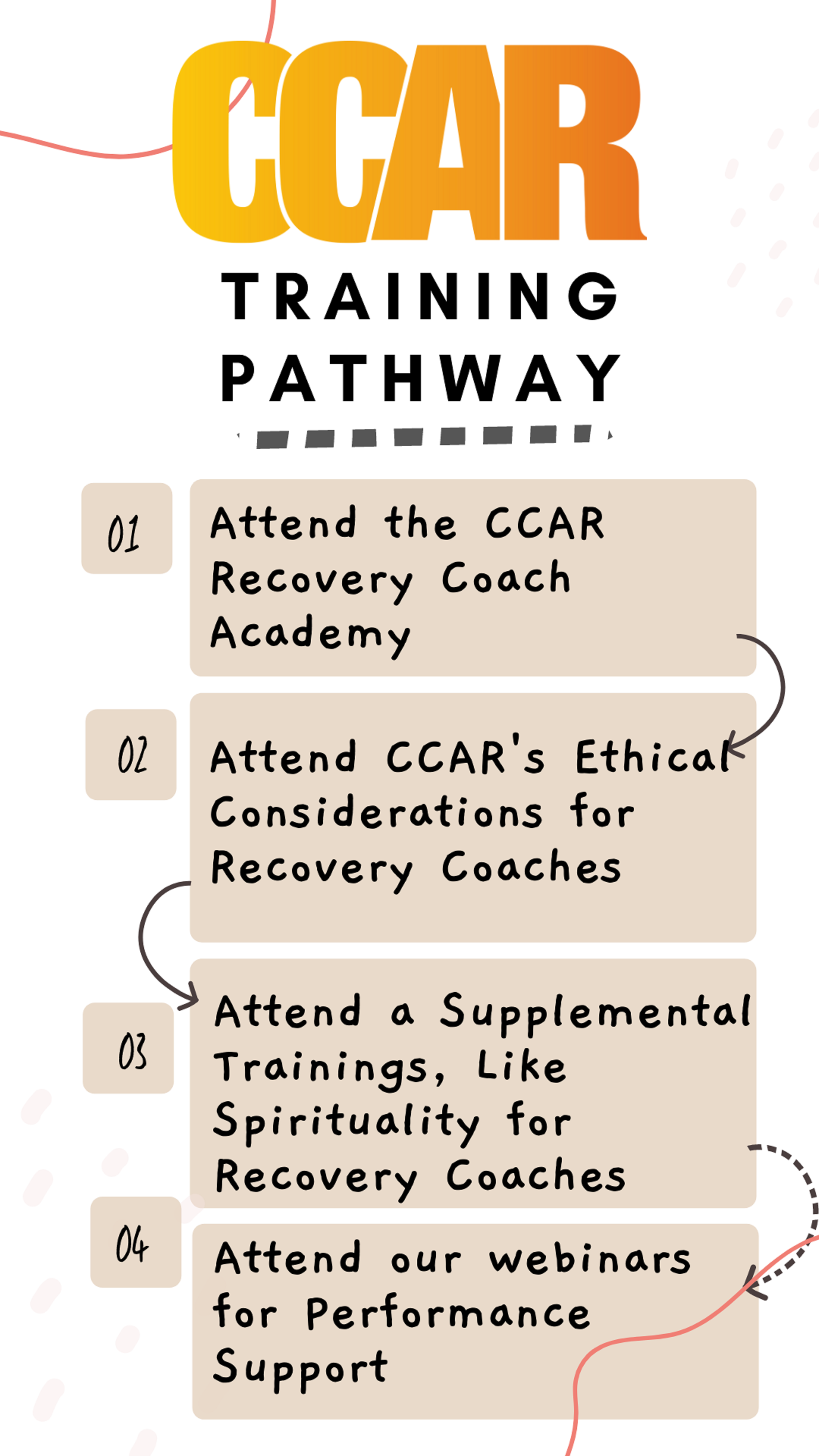
We are often asked, “When am I a recovery coach?” It’s a hard question to answer.
We have noticed the role of the recovery coach shifts based on the setting. Recovery coaches serve in many more professional settings than ever before. Because the role is expanding, many states rely on certification to assess the competence of the individual. Yet, for many, employment and certification opportunities still don’t exist. It seems there are as many barriers to becoming a coach as there are to accessing recovery.
We are left to consider these questions…
- Does being employed as a recovery coach make you a recovery coach?
- Does certification?
- So, again, when are you a recovery coach?
As the creator of the CCAR Recovery Coach Academy© in January 2009, we feel an obligation to share our learnings. We had no idea back then that this curriculum would become the most widely accepted training programs for those who desire to support others in a recovery process.
The 30-hour CCAR Recovery Coach Academy© introduces recovery coaching and the skills needed for success in that role. That said, recovery coaches are not completely built in 30 hours. As the training manuals states, “transformed people transform people”. Changes in attitudes, self-introspection, contemplation about approaches to recovery, thinking about recovery in general, are consistent outcomes, but no mastery, especially for a role like this, can be achieved in just 30 hours of training. The RCA initiates the process.
As the CCAR Recovery Coach Academy© rose to prominence, we answered the need for supplemental training for continued professional development of recovery coaches. The definition of supplement states: something that completes or enhances something else when added to it. Our additional programs build upon the skills that participants learn in the RCA.
We found that formal ethics training for coaches and peers was clearly lacking. We found many ethics offerings in the addiction field – but there were none specifically written to address the unique role of recovery coach. The multifaceted recovery coach role generates desperately needed positive outcomes, however, if recovery coaches do not consider and practice ethical boundaries, it will lead to undesired results, for not only those served, but for the recovery coach professions and even the entire recovery community.
We developed other training programs to promote multiple pathways of professional development. Recovery Coaches could choose from a variety of offerings based on their own individual needs. With topics ranging from spirituality, to professionalism, to working in a busy emergency department, each curriculum provides an opportunity for Recovery Coaches to gain new knowledge, fine tune existing skills, while developing their personal art of recovery coaching.
So… When am I a recovery coach? We believe you are a recovery coach when you say you are…. But we also know that won’t fly. So, lets share some specifics… we believe you are a recovery coach when you can do these three things well:
- Actively listen
- Ask good questions
- Discover and manage your own stuff.
We created the Recovery Coach Professional (RCP) designation to assess these abilities. Each applicant must have attended the CCAR Recovery Coach Academy© and Ethical Considerations for Recovery Coaches© as part of the 60-hours of required training. Applicants then are interviewed. Not everyone succeeds initially. But when they don’t, we offer written feedback and more professional development based on where they are (sounds a lot like coaching, doesn’t it?).
Recovery coaching takes constant practice and skill building, a blending of the science and the continued development of our own art. I once read that you achieve mastery of a skill/role after 10,000 hours of practice. Do I consider myself a Recovery Coach? Yes! But I am also aware that it will take me a bit longer before I’ve mastered it.
Even with a proven model, expanding training opportunities and an established definition, the recovery coach role has morphed into many different roles, due to a lack of funding, and reliance on billing and documentation. If you are doing an assessment, are you a recovery coach? When will we get to a point that the spirit of the role, and its true purpose, rest on its own proven success to create opportunities for employment at a livable wage? Recovery coaches want jobs, credibility, and acceptance, but at whose expense? Do you see the ethical dilemma?
Before investing in any training, we encourage people to check out employment opportunities to seek out what job and/or training requirements are for this role in your location.
If you still have questions, we are here to help! Send us an email, or call us 860.244-2227.
 The original RCA is a “building block” curriculum - an introduction to what recovery coaching is and the skills needed to be successful in that role. That said, recovery coaches are not built in 30 hours. As the training manuals states, “transformed people, transform people”. A change in attitudes, and thinking about oneself, or recovery in general, is achieved - no doubt, but no career path, especially for a role like this, can be completely understood in just 30 hours of training. The RCA is a beginning of this journey.
The original RCA is a “building block” curriculum - an introduction to what recovery coaching is and the skills needed to be successful in that role. That said, recovery coaches are not built in 30 hours. As the training manuals states, “transformed people, transform people”. A change in attitudes, and thinking about oneself, or recovery in general, is achieved - no doubt, but no career path, especially for a role like this, can be completely understood in just 30 hours of training. The RCA is a beginning of this journey.
As the RCA was embraced as the standard for training recovery coaches across the country, and abroad, we wanted to continue on our own journey to design supplemental programs to support the continued professional development of coaches. The definition of supplement states: something that completes or enhances something else when added to it. Our additional programs build upon the skills that are learned in the original 30 hour RCA Curriculum. We believe that all other curriculums will be better understood and embraced, if the original 30 hour RCA is taken first. The first supplemental program developed was Ethical Considerations. Although there are many Ethics trainings out there – there were none specifically written to address the unique role of Recovery Coach. The value of recovery coaching is in the relationships we build as motivators, cheerleaders, friends and companions to name a few. The role has many, many facets which is what makes it is so successful for those new to recovery, and why it can also be harmful if ethics aren’t considered and practiced.
Other training programs were then developed to offer multiple pathways of professional development. Recovery Coaches could chose from a variety of offerings based on their own individual needs. With topics ranging from spirituality, to professionalism, to working in a busy emergency department, each curriculum provides an opportunity for Recovery Coaches to gain new knowledge, fine tune existing skills, while connecting with other coaches to develop their personal art of recovery coaching.
We hope you find this information helpful as you contemplate this role or training for RC staff.